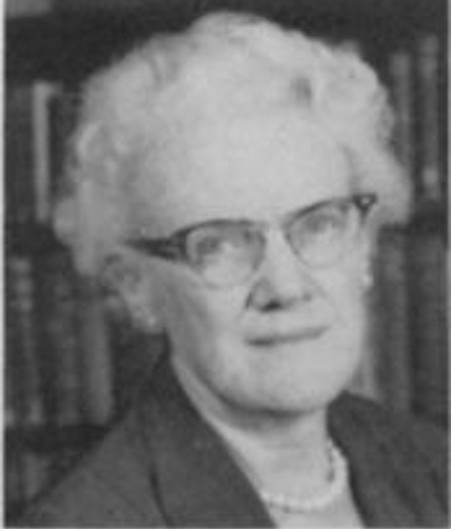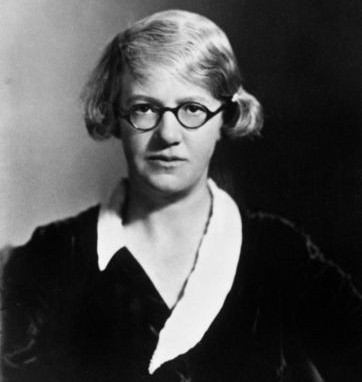Constance Mabel Winchell, 1896 – 1983

Constance Mabel Winchell was born in Northampton (Massachusetts) on November 2, 1896. She graduated from the University of Michigan in 1918 and earned a Masters degree from Columbia University in 1930. An influential reference librarian at Columbia University for more than 30 years, she authored the seventh and eighth editions of the Guide to Reference Books, a veritable bible of its time for librarians around the world.
In 1923, Winchell was working at the University of Michigan as a reference librarian when a friend, Eunice Wead (Rare Books Librarian at Smith College), recommended her for a job at the American Library in Paris, which was then desperate for professional staff. The job paid 1,800 francs a month but also afforded Winchell the opportunity to spend time abroad, from which a lifetime commitment to travel was born.
Winchell sailed from New York on the Aquitania in January 1924 and described her experience upon arriving in Paris in an account preserved in Columbia University's Oral History Archives:
I was so innocent! I did know I was going to the American University Women's Club, and I knew the address – I couldn’t pronounce it, but I knew it. It was 4 rue de Chevreuse. Of course the driver couldn’t understand me. I think I finally wrote it down for him, and off we dashed across the city.
When we got to the American University Women's Club I went in and they said, "Oh yes. We’re expecting you. The dining room is going to close in about five minutes, though, so you’d better go right in." And so without going upstairs, without washing my hands, without anything, I went into the dining room and was served a meal. I was almost through when Mary P. Parsons appeared. I don’t remember what her reactions were, but she sat down and had some dinner with me, although the dining room was closed by that time. But she lived there, and so they let her have something. Afterwards I was taken up to my room (Winchell transcript 60).
Mary P. Parsons, Winchell's contact and fellow resident at the Club, was already working at the American Library in Paris and is best known for having founded the Paris Library School, an opportunity for cross-cultural exchange between French and American librarians that was financed and supported by the American Library Association. It was a particularly wonderful program for women, who were increasingly joining the workforce in the aftermath of WWI. The war also figures prominently in Winchell's oral history, as she recounted the postwar experiences of deprivation in even the most unexpected places:
I was talking to someone about an interesting part of Paris, just the other night: the lack of paper in France at that time, which was right after the war. They just didn’t have paper. So, when you bought a tomato or an orange or a piece of fruit of any kind from one of those little stands or vegetable carts in the streets, the woman who sold it would have taken a couple of pages out of a magazine, sewn them up along the edges, and used this as a paper bag. They didn’t have paper bags; they couldn’t afford paper bags. Paper was very scarce (Winchell transcript 69-70).
Though Winchell recorded many details about her work at the American Library, she offered few insights into her life at the Club, where she stayed for approximately three months before moving in with a French family to improve her language skills. She did, however, describe her first room at 4 rue de Chevreuse:
For the first month or two my room was the room occupied ordinarily by Helen Waddell. Helen Waddell was an Englishwoman, a scholar and a writer. She’s written a number of books, including The Wandering Scholars and Peter Abelard. I didn’t know anything about her then, but her room had a whole wall lined with books. The first couple of months I was there, then, I spent evenings reading her library – a very good one! (Winchell transcript 60-1).
Waddell (1889 – 1965) was actually Irish, and became a well-known poet, translator, and playwright. The Wandering Scholars book that Winchell references was a groundbreaking 1927 study of the medieval goliards, young 12th- and 13th-century European clergymen who wrote satirical Latin poetry (which Waddell translated in a companion volume, Medieval Latin Lyrics).
Winchell remained in France for about 18 months, returning to the United States in 1925 and embarking on what would become a legendary career at Columbia University Libraries that September. She truly valued her time in Paris and encouraged others to go abroad:
[...] I certainly got a great insight into how people lived in another country, and I think that’s very important. I would advise young people - before they get to the place where they can’t afford to move - to go to another country for a year or so. I think that’s a great experience (Winchell transcript 68).
Winchell retired from her position at Columbia in 1962. She died on May 23, 1983 at the age of 86 in her home at New Paltz, New York.
Sources
- Blackett, Monica. The Mark of the Maker: A Portrait of Helen Waddell. London: Constable, 1973.
- "Constance Winchell of Columbia Library." The New York Times, May 25, 1983, p. 24. Timesmachine.
- Slocum, Grace P. "1960 American Library Association awards, citations, and scholarships." ALA Bulletin, vol. 54, no. 8, September 1960, pp. 688-692. JSTOR.
- Winchell, Constance M. Reminiscences of Constance Mabel Winchell. 1963. Oral history. Individual interviews oral history collection, Columbia Center for Oral History, Columbia University. Columbia Digital Library Collections.
